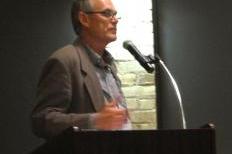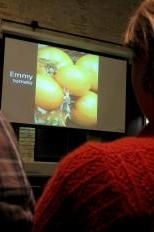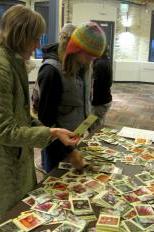







“Every seed has a story to tell,” Torgrimson said. As executive director of Seed Savers Exchange, he leads one of the largest seed preservation efforts in North America, fueled in part by gardeners saving and mailing their favorite seeds to the nonprofit. Often the seeds come with a letter, detailing the plant’s journey before arriving into the care of Seed Savers in northeastern Iowa.
Torgrimson shared a few of those stories on Wednesday. He told one about a cream-colored lima bean with dark purple mottling named after the Nebraskan who had sent it, Phoebe Vincent. Another story featured the golden tomato named Emmy after a Transylvanian woman who snatched it from her homeland before fleeing from German invasion. Passing plants down through generations is what makes them heirloom varieties Torgrimson said, defining a popular term in Madison food culture.
Maintaining a diverse collection of seeds is preserving our history and also our ability to cope with future changes, he stated.
“Even if a seed has no commercial value now, it may be an ace in the hole later,” he said. Whether battling plant
Kiera Mulvey, executive director of Fairshare CSA Coalition, invited Torgrimson to speak as part of a four-part series. Each talk in the series extrapolates on community-supported agriculture while focusing on a theme. This was the third talk, with a focus on the environment and the importance of biodiversity.
Seed Savers helps to preserve plant biodiversity by maintaining the viability of as many types of seeds as possible. The seed bank keeps seeds frozen at zero degrees Fahrenheit, and employees systematically extract the seeds to grow them to ensure their vitality. In addition to maintaining its own seed bank, Seed Savers contributes to Svalbard Global Seed Vault in Norway, nicknamed Noah’s Ark for seeds because of its significance in preserving the world’s germplasm -- or genetic resources.
To give a sense of the scale of Seed Savers efforts, Torgrimson mentioned that for apples alone, the organization grows over 1900 varieties, about half of the types of apples still around.
“We’ve lost more than 16,000 apple varieties since 1629,” he said. Torgrimson described the loss of biodiversity for several types of fruits and vegetables. He shared the results of a study that compared seed catalog offerings from 1903 and 1983. The number of varieties of many vegetables on sale decreased exponentially over time. For instance, in 1903, 497 lettuce varieties were for sale in American seed catalogs but by 1983 that dropped to 36 lettuce varieties.
One attendee, Madison resident Darin Ripp, said he purchases Seed Savers seed for his farm, First Acre. Ripp graduated last May from UW-Madison with a bachelor’s degree in wildlife ecology and environmental science.

Also in attendance was Eve Emshwiller, UW-Madison associate professor of botany. Emshwiller teaches the university’s ethnobotany course and said she has been a member of Seed Savers since 1984.
“In the ‘80s if you had said heirloom, people would not have known what you were talking about,” Emshwiller said. For the popularity of heirloom vegetables, both with growers and at restaurants, Emshwiller said a lot of the credit goes to Seed Savers.
After finishing his talk, Torgrimson commented that Madison was an ideal place to talk about the Seed Savers mission.
“Madison has a progressive local food scene and really impressive support of an alternative food system,” he said.
The final talk in Fairshare CSA Coalition’s series is scheduled for 6:30 p.m. on November 14 in the UW-Madison Soils building. It's titled “Local Food as a Strategy for Economic Recovery.”
|
|
|
Welcome to the Madison Commons, a website designed to provide news and information about all of Madison's neighborhoods and a crossroads for the discussion of community issues. The name comes from the idea of a village commons, a place for news, talk, debate, and some entertainment, too, that's open to everyone.
All rights reserved. Read more about the Madison Commons and its partners.


Comments
We're not so dumb
Twice in the article, people say that the public doesn't know what the word "heirloom" means.
Guess what? We do, and we're tired of being talked down to. I know that Wisconsin Public Radio in their job descriptions says you have to dumb down coverage to work for them.
Does it have to be like that, here, too?